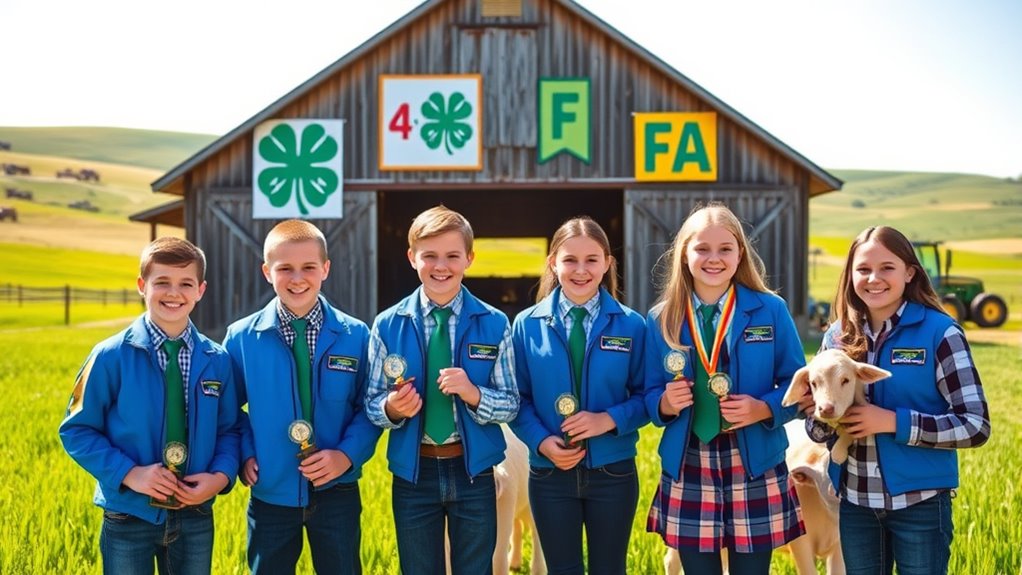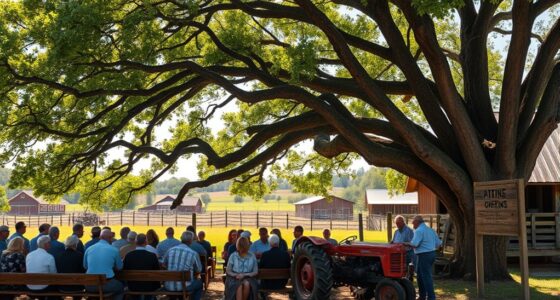4-H, FFA, and other rural youth programs offer you valuable opportunities to develop leadership, agricultural skills, and community involvement. Through hands-on experiences like farming, sustainability practices, and team projects, you can build confidence and prepare for future careers. These programs also connect you with mentors and industry professionals, opening doors to internships and scholarships. Stay with us as we explore how these initiatives can help shape your future in agriculture and beyond.
Key Takeaways
- 4-H and FFA provide hands-on agricultural education, leadership development, and community service opportunities for rural youth.
- These programs promote sustainable farming practices and natural techniques to foster environmental responsibility.
- They connect youth with mentors, industry professionals, and resources for internships and career pathways.
- Participants develop skills in teamwork, communication, and responsibility through projects, competitions, and community engagement.
- 4-H and FFA aim to prepare the next generation of rural leaders to sustain and grow local agriculture and communities.

Have you ever wondered how rural youth programs make a difference in small communities? These programs, like 4-H and FFA, are more than just activities; they’re powerful tools that shape the future of rural areas. One of their main strengths lies in agriculture education, which helps young people understand the essential role farming and related industries play in their communities. By participating, you gain hands-on experience with crop management, livestock care, and sustainable farming practices. This knowledge not only boosts your confidence but also prepares you to contribute meaningfully to local agriculture. As you learn about soil health, pest control, and farm economics, you develop a deeper appreciation for the complexities of agricultural work. These programs guarantee that rural youth are well-informed about current trends and innovations, equipping you with skills that are crucial in today’s evolving food systems. Additionally, understanding natural techniques for seed production can inspire innovative approaches to farming and sustainability. Leadership development is another cornerstone of rural youth programs. As you engage in team projects, competitions, and community service, you learn how to lead effectively. These opportunities challenge you to organize events, collaborate with peers, and communicate your ideas clearly. Through leadership training, you gain the confidence to take on responsibilities and motivate others, whether you’re managing a project or advocating for local issues. This development isn’t just about personal growth; it’s about preparing you to become a future leader in your community. Many programs emphasize ethics, responsibility, and service, helping you understand the importance of giving back. Over time, you learn to balance assertiveness with empathy, skills that are valuable in any career or community role. Participating in rural youth programs also connects you with mentors and professionals who share your interests. These relationships can open doors to internships, scholarships, and career opportunities in agriculture and other rural industries. The networks you build can support your educational goals and help you stay engaged in your community’s development. Plus, being part of a group fosters a sense of belonging and pride. You realize you’re not alone in facing challenges and that your efforts can make a tangible difference locally. As you develop leadership skills and deepen your understanding of agriculture, you become more empowered to contribute to your community’s growth and sustainability. In essence, programs like 4-H and FFA are designed to nurture the next generation of rural leaders. They provide practical education and leadership training that prepares you for a successful future, whether in agriculture or other fields. By participating, you’re investing in your community’s vitality and ensuring that rural areas continue to thrive for generations to come.
Frequently Asked Questions
How Can I Join 4-H or FFA Programs in My Area?
To join 4-H or FFA programs in your area, start by visiting your local extension office or agricultural school’s website. You can register online or pick up a registration form at the office. Attend local club meetings to learn more about upcoming activities and requirements. Engaging early helps you connect with members and find the right program fit, making your involvement enjoyable and rewarding.
What Are the Eligibility Requirements for Rural Youth Programs?
Think of rural youth programs like a garden needing the right seeds to grow. Eligibility criteria typically include being within a certain age range, residing in a rural area, and showing a genuine interest in agriculture or community service. Program participation often requires applying through local chapters, demonstrating commitment, and sometimes meeting specific residency or academic standards. If you meet these criteria, you’re already on your way to cultivating new skills and connections.
Are There Scholarships Available Through These Programs?
Yes, scholarship opportunities are available through these programs, providing valuable funding options for your education. You can access various scholarships based on your involvement, achievements, or future goals. Stay proactive by checking program websites and talking to leaders or mentors, as they often have information about current funding options. Applying early and carefully following application guidelines will boost your chances of receiving financial support for your academic journey.
How Do These Programs Benefit Career Development?
You might think these programs only focus on agriculture, but they actually boost your career development considerably. You gain mentorship opportunities that guide your growth and build your leadership skills, making you more confident and prepared for future jobs. These experiences help you stand out to employers, showing your initiative and ability to lead. Embracing these programs can open doors and accelerate your professional journey in any field.
What Types of Projects Can Youth Participate In?
You can participate in a variety of projects like agricultural experiments to explore new farming techniques or innovations. Community service projects allow you to give back and develop leadership skills. Other options include animal care, gardening, cooking, and environmental conservation. These projects help you gain hands-on experience, build confidence, and develop a well-rounded skill set that benefits your future academic and career pursuits.
Conclusion
As you step into the world of 4-H, FFA, and other rural youth programs, you realize they’re more than just activities—they’re gateways to your future. The skills you gain could lead to unexpected opportunities, friendships, and adventures. But the true impact remains a mystery, waiting to unfold as you get involved. Will you be the next story of success? The journey begins now, and the possibilities are endless—what will you discover along the way?










